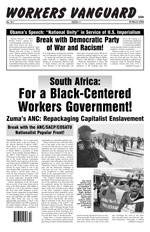
Imperialism and World Economy (Quote of the Week) By the end of the 19th century, the world capitalist economy was dominated by the monopolies, trusts and cartels of the great powers in North America, West Europe and Japan. Twice in the 20th century—in World War I and II—the imperialists waged war against each other for the redivision of markets and spheres of exploitation. It was in the context of the First World War that the 1917 Bolshevik Revolution took place, the greatest historic victory for the international proletariat. Only the working class has the social power to sweep away the capitalist order through socialist revolution and lay the basis for an internationally planned and collectivized economy, the essential precondition for human emancipation from imperialist subjugation and war. In his work Imperialism and World Economy, written in 1915 and published two years later, then-leading Bolshevik Nikolai Bukharin outlined imperialism’s development. The development of the productive forces of world capitalism has made gigantic strides in the last decades. The upper hand in the competitive struggle has everywhere been gained by large-scale production; it has consolidated the “magnates of capital” into an ironclad organisation, which has taken possession of the entire economic life. State power has become the domain of a financial oligarchy; the latter manages production which is tied up by the banks into one knot. This process of the organisation of production has proceeded from below; it has fortified itself within the framework of modern states, which have become an exact expression of the interests of finance capital. Every one of the capitalistically advanced “national economies” has turned into some kind of a “national” trust. This process of the organisation of the economically advanced sections of world economy, on the other hand, has been accompanied by an extraordinary sharpening of their mutual competition. The overproduction of commodities, which is connected with the growth of large enterprises; the export policy of the cartels, and the narrowing of the sales markets in connection with the colonial and tariff policy of the capitalist powers; the growing disproportion between tremendously developed industry and backward agriculture; the gigantic growth of capital export and the economic subjugation of entire regions by “national” banking combines—all this has thrown into the sharpest possible relief the clash of interests between the “national” groups of capital. Those groups find their final argument in the force and power of the state organisation, first of all in its army and navy. A mighty state military power is the last trump in the struggle of the powers. The fighting force in the world market thus depends upon the power and consolidation of the “nation,” upon its financial and military resources. A self-sufficient national state, and an economic unit limitlessly expending its great power until it becomes a world kingdom—a world-wide empire—such is the ideal built up by finance capital. —Nikolai Bukharin, Imperialism and World Economy (1917)
|
|
||||||||||||||||||||||||||||||||||||||


